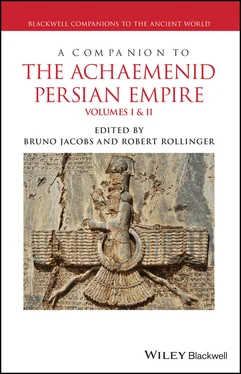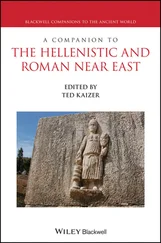Ali Mousavistudied in Lyon, France, and obtained his PhD in Near Eastern Archeology from the University of California, Berkeley. He is the author of Persepolis. Discovery and Afterlife of a World Wonder (2012). He teaches Iranian archeology at the University of California, Los Angeles.
Krzysztof Nawotka, educated at Wroclaw, Oxford, and Columbus, OH (PhD in Classics 1991), is Ancient History Professor at the University of Wroclaw, Poland. His principal books are The Western Pontic Cities: History and Political Organization (1997), Boule and Demos in Miletus and its Pontic Colonies (1999), Alexander the Great (2010), The Alexander Romance by Ps.‐Callisthenes: A Historical Commentry (2017), and Epigraphic Culture in the Eastern Mediterranean in Antiquity (2020).
Astrid Nunnis a Near Eastern Archaeologist, former adjunct Professor at the University of Würzburg (Germany). Her main fields of interest are the Achaemenids in the Levant, polychromy, and iconography.
Daniel T. Pottsis Professor of Ancient Near Eastern Archaeology and History at the Institute for the Study of the Ancient World, New York University. He received his PhD from Harvard and has worked extensively in Iran, both at Tepe Yahya and in the Mamasani region.
Joachim Friedrich Quackstudied Egyptology, Semitic Languages, Biblical Archaeology, Assyriology, and Prehistory at the universities of Tübingen and Paris. He is Director of the Institute of Egyptology at Heidelberg University. He is a full member of the Heidelberg Academy of Sciences and a foreign member of the Danish Academy of Sciences and Letters. He was awarded the Leibniz Prize in 2011.
Claude Rapinis an Archeologist and Researcher at the CNRS (UMR‐8546), École normale supérieure, Paris, “Archéologies d’Orient et d’Occident et textes anciens (AOROC)” and Privatdozent at the University of Lausanne. He has undertaken excavations in Afghanistan (Ai Khanum) and Uzbekistan (Samarkand‐Afrasiab, Koktepe, Iron Gates near Derbent, Kindikli‐tepe, Yangi‐rabat, Sangir‐tepe). He has published on the archeology, history, and historical geography of Central Asia.
Robert Rollingeris Full Professor at the Department of Ancient History and Ancient Near Eastern Studies, Leopold‐Franzens Universität Innsbruck since 2005. From 2011 to 2015 he was Finland Distinguished Professor at the Department of World Cultures, University of Helsinki, from 2021–2025 he holds a NAWA chair as Visiting Professor at the University of Wrocław, Poland (Programme “From the Achaemenids to the Romans: Contextualizing empire and its longue‐durée developments”). His main research interests are Greek historiography, history of the first millennium BCE, and comparative empire studies.
Adriano V. Rossiis Professor Emeritus of Iranian philology at L’Orientale University, Naples, where he was Rector from 1992 to 1998. He is a member of many academies and scientific societies, including Accademia dei Lincei, Rome. His main subjects (with more than 200 publications) are Iranian linguistics/philology and dialectology. Since 2002 he has been Director of the international project DARIOSH (Digital edition of the Achaemenid royal inscriptions) and since 2016 President of ISMEO‐Rome.
Kai Ruffingis Professor for Ancient History at the University of Kassel, Germany. His main interests in research include the social and economic history of the ancient world, classical historiography, and transcultural contacts between Mediterranean and Middle Eastern cultures in antiquity.
Mirjo Salvinihas been Director of the Institute for Aegean and Near Eastern Studies, Rome. His special research focus is on philology and history of the Ancient Near East in very broad terms. He has done extensive field work in Armenia, Turkey, Syria, and Iran. He has edited and published cuneiform texts from Boghazköy (Hittite), Syria (Akkadian and Hurrian), Iran (Linear Elamite), and Armenia, Turkey (Urartian). His opus magnum is the publication of the “Corpus dei testi urartei” (five volumes, 2008–2018).
Rüdiger Schmitt, Emeritus Professor of Comparative Philology and Indo‐Iranian Studies at Saarland University in Saarbrücken, is a specialist in ancient Iranian languages and onomastics, but has worked also on the Greek and Armenian languages. He is co‐editor of the Iranisches Personennamenbuch of the Austrian Academy of Sciences.
Gundula Schwinghammerholds a PhD in Ancient History at the University of Innsbruck. Her research deals chiefly with the Achaemenid Persian empire and regime changes in the Ancient Near East.
Sören Starkis Assistant Professor for Central Asian Archaeology at the Institute for the Study of the Ancient World at New York University. His research focuses on Central Asian archeology and history from the Early Iron Age to the Islamic Middle Ages, in combination with archeological fieldwork in Bukhara/Uzbekistan.
Matthew W. Stolperis the John A. Wilson Professor Emeritus of Oriental Studies and Director of the Persepolis Fortification Archive Project at the Oriental Institute of the University of Chicago.
David Stronachwas Professor Emeritus of Near Eastern Archaeology at the University of California, Berkeley. He has directed excavations at Pasargadae, Tepe Nush‐i Jan, Nineveh, and Erebuni. He had a particular interest in the archeology and history of the early Achaemenids, the Medes, the Neo‐Assyrians, and the Urartians.
Jan Tavernier(PhD 2002, KU Leuven) is professor in Ancient Near Eastern Studies at the Université Catholique de Louvain (Belgium). His research axes are Elamite history and linguistics, Achaemenid history, Ancient Near Eastern onomastics, and Ancient Near Eastern linguistic history of the first millennium BCE.
Gocha Tsetskhladzetaught at London and Melbourne, specializing in ancient Greek colonization and the archeology of the Mediterranean, Black Sea, Caucasus, and Anatolia in the first millennium BCE. For 30 years he has excavated Greek colonial sites around the Black Sea and at Pessinus in central Anatolia. He has published extensively. He is affiliated to Linacre College, Oxford.
Günter Vittmannstudied Egyptology and ancient Semitic languages. He earned his PhD 1977 in Vienna ( Priester und Beamte im Theben der Spätzeit , published 1978) and his Habilitation in 1994 at Würzburg ( Der demotische Papyrus Rylands 9 , published 1998). He was appointed Associate Professor at Würzburg in 2001. His special fields of research are Egyptian philology, Demotic and Hieratic, and relations between Egypt and her neighbors.
Melanie Wasmuthis a Docent in Egyptology and Ancient Near Eastern Studies at the University of Helsinki and affiliated to the Egyptology Section of the University of Basel. She specializes in the impact of cross‐regional migration, cultural encounters and political expansion on material culture and identity constructions in the first millennium BCE.
Josef Wiesehöferreceived his PhD in 1977 (Mu¨nster) and Habilitation in 1988 (Heidelberg). From 1989 to 2016 he was Full Professor of Ancient History at the Department of Classics at the Christian‐Albrechts Universität Kiel. His main research interests are the history of pre‐Islamic Persia and intercultural exchange between East and West in antiquity. He has published extensively on ancient Persia, with a special interest in Parthian and Sasanian history.
Michael Zahrntwas Professor of Ancient History at the University of Cologne. His research has focused on Greek History from the Archaic Age to the expansion of Rome, with special emphasis on Macedonia and Alexander the Great; and on the emperor Hadrian.
Читать дальше












